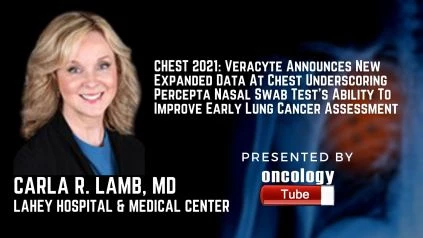Carla R. Lamb, MD an interventional pulmonologist at Lahey Hospital and Medical Center speaks about Veracyte Announces New Expanded Data At Chest Underscoring Percepta Nasal Swab Test’s Ability To Improve Early Lung Cancer Assessment.
Link to Article:
https://investor.veracyte.com/news-releases/news-release-details/veracyte-announces-new-expanded-data-chest-underscoring-percepta
Veracyte, Inc. reported today that new expanded clinical validation data back up the company’s noninvasive Percepta Nasal Swab test’s ability to help clinicians better identify lung cancer risk in patients with lung nodules. The data also suggest that the test performs well in the clinic across a wide range of nodule sizes and cancer stages in current and former smokers, as well as individuals who have had other cancers (s).
The new findings highlight the Percepta Nasal Swab test’s capacity to help clinicians more reliably, promptly and confidently select whether patients with lung nodules discovered on computerized tomography (CT) scans should undergo diagnostic work-ups and, if necessary, get treatment. The findings will be presented in an oral session at the 2021 Annual Meeting of the American College of Chest Physicians (CHEST), which will be held virtually from October 17 to 20, 2021. Veracyte also announced that it has started making the Percepta Nasal Swab test available to a small number of clinical sites as it gathers clinical usefulness evidence for reimbursement.
A blinded, independent validation set of 249 patients from several cohorts containing prospectively obtained nose samples previously demonstrated the Percepta Nasal Swab test’s solid efficacy in categorizing lung cancer risk. All of the patients were current or previous smokers who had CT scans that revealed lung nodules. Patients were monitored for up to a year or until a final, adjudicated diagnosis was made by physicians. 63 more patients with past (non-lung) malignancies who were part of a planned secondary endpoint analysis are included in the new enlarged data being presented at this year’s CHEST summit.
When the Percepta Nasal Swab test identified patients as low risk in the extended cohort of 312 patients, its sensitivity was 97 percent, with a negative predictive value (NPV) of 98 percent in a population with the 25% cancer prevalence expected in a broad group with suspicious lung nodules. This NPV would help clinicians avoid unnecessary invasive procedures in patients who have a very low chance of missing a malignancy. The test has a specificity of 92 percent when identifying patients at high risk, with a positive predictive value (PPV) of 70 percent at a malignancy rate of 25%. This PPV would aid physicians in sending these patients to additional procedures in order to acquire an accurate diagnosis and, if necessary, shorten the time to therapy. Current clinical guidelines could be used to handle patients in the moderate-risk group.
Researchers discovered that the Percepta Nasal Swab test’s performance is strong across different nodule sizes in a sub-analysis of the expanded validation set, with the test identifying 67 percent of cancers in nodules below 8 mm as moderate risk, while labeling 100 percent of malignant nodules greater than or equal to 8 mm as high or moderate risk. The results were likewise consistent across all stages of non-small cell lung cancer (NSCLC), with 100 percent of malignancies classified as moderate or high risk at Stage II or higher.
Real-world data will also be presented at the CHEST meeting, illustrating how the Percepta Genomic Sequencing Classifier (GSC) can aid patients with suspected lung nodules whose bronchoscopy results were inconclusive decrease unnecessary procedures, and guide the next stages in lung cancer evaluation. Researchers from the Medical College of Wisconsin discovered that the Percepta GSC reclassified one-third of lung nodules with unclear bronchoscopy results as either low risk or high risk in a retrospective clinical utility assessment. Similarly, researchers from AnMed Health Medical Center in Anderson, South Carolina, discovered that the Percepta GSC enabled more than half of patients’ indeterminate lung nodules to be reclassified, with a significant reduction in the rate of invasive follow-up procedures among those moved to a low-risk category.
The Percepta Nasal Swab test and GSC use modern genetic technologies to detect smoking-related damage in the respiratory tract of current or former smokers, which is linked to lung cancer. Both tests are part of Veracyte’s entire lung cancer portfolio, which strives to improve patient treatment at every stage. The company’s tests use cutting-edge genomic research and technology to deliver answers and insights that help doctors and patients make better, faster and more confident healthcare decisions. The in-development Percepta Genomic Atlas, part of Veracyte’s lung cancer portfolio, is designed to detect gene mutations that may influence lung cancer therapy options using the same tiny biopsy that was used for diagnosis.

